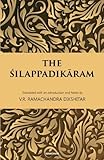The Śilappadikāram / tr. [from the Tamil] with an introduction and notes by V. R. Ramachandra Dikshitar, with a foreword by Jules Bloch
Material type: TextLanguage: engtam Publication details: [London] : Oxford University Press, 1939. c2021.Description: xiv, [1], 392 p. front., mapISBN:
TextLanguage: engtam Publication details: [London] : Oxford University Press, 1939. c2021.Description: xiv, [1], 392 p. front., mapISBN: - 9789390035922
- Cilappatikāram. English
- 894.91 ILA
| Item type | Current library | Collection | Call number | Status | Date due | Barcode |
|---|---|---|---|---|---|---|
 General Books
General Books
|
CUTN Central Library Literature | Fiction | 894.91 ILA (Browse shelf(Opens below)) | Available | 47552 |
Browsing CUTN Central Library shelves, Shelving location: Literature, Collection: Fiction Close shelf browser (Hides shelf browser)

|

|
No cover image available No cover image available |

|

|

|

|
||
| 894.81427 KAR Yayati : | 894.825 SAT ஆலிலையும் நெற்கதிரும் | 894.8271209 VEN Flowers at his feet : | 894.91 ILA The Śilappadikāram / | 895.135 LIU The three body problem / | 895.135 LIU The dark forest / | 895.635 MUR Colorless Tsukuru Tazaki and his years of pilgrimage : A novel / |
The Silappadikaram
The Silappadikaram
by V.R. Ramachandra Dikshitar
ISBN - 9789390035922
Cover - HardBound
Publication Year - 2023
Pages - 392p.
Price - INR 1750.00
This translation of the ancient Tamil epic poem by Ilango Adigal, speculated to be written in the second century ad, was first published in 1935. It was part of a project to bring to light the priceless literary treasures of Tamil for non-Tamil readers. There is no doubt of the excellence of this epic about Kovalan, a young merchant and Kannaki, his virtuous wife. Kovalan had set out for Madura to dispose of an anklet to raise the capital needed to pursue a trade. In the bazaar he meets a state goldsmith. The latter had stolen the queen’s anklet similar to the one on Kovalan’s hands and reports to the king that he had found the thief. He is arrested and executed. Kannaki comes to Madura to prove her husband's innocence. The Pandyan king dies of remorse realizing his mistake. Kannaki, to avenge her husband's death tears off one breast and throws it at the city of Madura which goes up in flames. In ancient Tamil Sangam tradition, the book contains exceptional descriptions of the rivers like the Vaigai and Kaveri, cities like Puhar and Madura, technical accounts of different dance forms, celebration of marriages, the intermingling of Greek, Arab and Tamil peoples – all affording data for the reconstruction of ancient Tamil society. About the Author V.R. Ramachandra Dikshitar (1896-1953) was a historian, Indologist and Dravidologist. He was Professor of History and Archaeology at the University of Madras. He is author of several standard textbooks of Indian History. He was also a renowned Sanskrit scholar of his time.


There are no comments on this title.